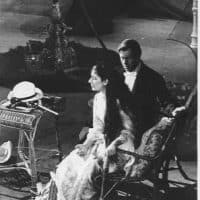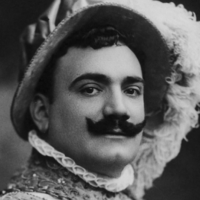 The “Divine Emmy” as she is known was perhaps the greatest dramatic soprano voice to ever live, with many of her roles considered unparalleled in performance, and commanding her as the highest paid female singer at the Met during the first decade of the 1900s. Emmy Destinn was born in 1878 in Prague to a very prominent family and surrounded by music and voice from the very beginning – her mother being an opera singer. Despite the easy nature of her upbringing, Destinn worked tirelessly on her voice and her debut as Santuzza in 1898 catapulted her career to stardom. Cosima Wagner invited her to Bayreuth to sing Senta in the very first Dutchman production there; and following this great triumph she was invited by Strauss to create the role of Salome.
The “Divine Emmy” as she is known was perhaps the greatest dramatic soprano voice to ever live, with many of her roles considered unparalleled in performance, and commanding her as the highest paid female singer at the Met during the first decade of the 1900s. Emmy Destinn was born in 1878 in Prague to a very prominent family and surrounded by music and voice from the very beginning – her mother being an opera singer. Despite the easy nature of her upbringing, Destinn worked tirelessly on her voice and her debut as Santuzza in 1898 catapulted her career to stardom. Cosima Wagner invited her to Bayreuth to sing Senta in the very first Dutchman production there; and following this great triumph she was invited by Strauss to create the role of Salome.
Her voice was one of brilliant power and vibrancy imbued with tremendous musical intelligence. Vocally I can think of no other soprano who harnesses the kind of richness of tone and harmonic depth that Destinn was able to do. It is a voice of such great complexity, such immense chiaro-scuro, that very few sopranos in history have really ever come close to emulating. Equally at home in Wagner as she is in Verdi, Puccini, or indeed the great Czech composers, here is Emmy Destinn singing “Dich teure Halle” from Wagner’s Tannhauser, recorded in 1906.
Recordings









